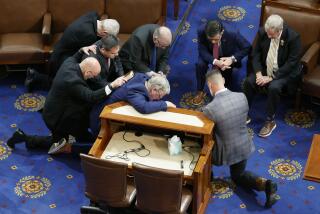Church Panel Votes to Defrock Ex-NAACP Head
- Share via
Benjamin F. Chavis Jr., the former executive director of the National Assn. for the Advancement of Colored People who was fired in a sexual harassment controversy, is facing another uproar--this one in his church.
In an unprecedented action, a committee of his mainline Protestant denomination, the United Church of Christ, this week recommended termination of Chavis’ standing as an ordained clergyman because he has joined the black Muslim sect led by Minister Louis Farrakhan. Chavis wanted to remain a Christian clergyman and at the same time serve as a minister with the Nation of Islam.
The church’s action prohibits Chavis from preaching, administering the sacraments or performing other pastoral duties as a minister of the 1.5-million-member denomination.
During a Los Angeles news conference Friday, one day after his church’s action in Durham, N.C., Chavis was unapologetic about his conversion and said he did not need the church’s permission to join the Nation of Islam.
The 49-year-old minister vigorously defended the Muslim group and Farrakhan against allegations of anti-Semitism and said he did not believe that Iran or Libya, which have been friendly to Farrakhan, support terrorism, as charged by the Clinton administration.
“The God who called me to the Christian ministry is the same God who called me to the ministry of Islam,” Minister Chavis Muhammad, as he is now called, said in his first public statement since the church action. Chavis was flanked by plainclothes Nation of Islam security guards at Mosque 27, the group’s Western regional headquarters, at Vermont and Manchester avenues.
“There’s only one God,” Chavis said. “The God of Judaism and the God of Christianity and the God of Islam is the same God. If God is one and if we affirm the oneness of God, then we should not allow religious divisions to get in the way of unifying a people in need of resurrection, in need of liberation.”
The Rev. Rollin Russell, a ranking minister in the United Church of Christ, said the vote by the 11-member committee was not unanimous but was a clear majority, with African Americans and whites casting ballots on both sides of the issue.
Chavis was ordained in the United Church of Christ in 1980. He announced his conversion to the Muslim group in February and had been a key organizer of Farrakhan’s Million Man March in Washington, D.C.
“Our confession is that Jesus Christ is Son of God, Savior and Lord,” Russell said in a statement distributed by the church. “If I could sum up the feeling of many on the commission, it is that ‘there need be no other name’ [but Jesus’]. We understand that he has become a member of another world faith.”
Chavis’ standing as a minister previously was temporarily suspended pending Thursday’s review, which ended with the recommendation that his ministerial status be terminated. The action is expected to be final within two months, church leaders said.
Chavis said Friday that he would be speaking from both a United Church of Christ pulpit and at a mosque Sunday, despite his own church’s ban on preaching.
The Rev. Madison T. Schockley II, a longtime friend and pastor who invited Chavis to speak, said the minister would not be “preaching” Sunday but engaging in a “dialogue” with members. His appearance before the Congregational Church of Christian Fellowship at 2085 S. Hobart Blvd., is from 4 p.m. to 6 p.m.
At the same time, Chavis, in response to questions from reporters, defended his new sect and Farrakhan against allegations of anti-Semitism and anti-white rhetoric. “The Nation of Islam does not have a history of anti-Semitism. That’s an unfair, unsubstantiated allegation and charge that’s always brought up,” Chavis said.
Asked to comment, Rabbi Abraham Cooper, associate dean of the Simon Wiesenthal Center in Los Angeles, which tracks anti-Semitism worldwide, said: “I can only assume he didn’t do his homework.”
Chavis also defended Farrakhan’s cordial relationship with Libyan President Moammar Kadafi. Last year, Kadafi honored Farrakhan with the Moammar Kadafi International Human Rights Award, worth $250,000. For legal reasons Farrakhan declined the cash but accepted the award. The Times quoted diplomatic sources last year as saying Farrakhan had obtained $5 million from Iranian leaders, but the Nation of Islam declined to comment.
Chavis said he was with Farrakhan last year in Libya. “I felt at home in Libya,” Chavis said, explaining that it is part of Africa and that he is an African American. “And I feel that President Kadafi is my brother.”
Asked about the Clinton administration description of Libya and Iran as “terrorist states,” Chavis said: “I have not been to Iran. I have been to Libya, and nothing I have seen in Libya would make me feel or even think that it’s a terrorist nation. . . . I have not had an opportunity to go to Iran, but from what I know from just studying empirical data and resources, I do not believe Iran is a terrorist nation. Before we start looking abroad for terrorists, we should start looking at home.”
Chavis was fired in 1994 as executive director of the NAACP because of his management of the organization’s finances and his handling of a former aide’s sexual discrimination complaint.
More to Read
Sign up for Essential California
The most important California stories and recommendations in your inbox every morning.
You may occasionally receive promotional content from the Los Angeles Times.










